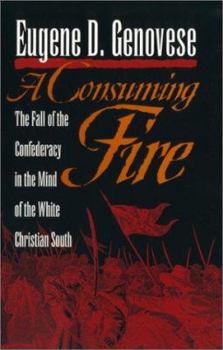A Consuming Fire: The Fall of the Confederacy in the Mind of the White Christian South (MERCER UNIVERSITY LAMAR MEMORIAL LECTURES)
(Part of the Mercer University Lamar Memorial Lectures Series)
Select Format
Select Condition 
Book Overview
The fall of the Confederacy proved traumatic for a people who fought with the belief that God was on their side. Yet, as Eugene D. Genovese writes in A Consuming Fire , Southern Christians continued... This description may be from another edition of this product.
Format:Hardcover
Language:English
ISBN:0820320463
ISBN13:9780820320465
Release Date:January 1999
Publisher:Univ of Georgia Pr
Length:180 Pages
Weight:0.84 lbs.
Dimensions:9.0" x 0.8" x 5.3"
Customer Reviews
2 ratings
Immorality as a Morally Closed System
Published by Thriftbooks.com User , 15 years ago
This is an important book, not just because it is authored by the eminently esteemed Professor of History and author of the magisterial "Roll, Jordan, Roll," (still one of the best books I have ever read) Professor, Eugene D. Genovese, or for the superb research that supports the main thesis line, but also and more importantly, because of what its subtext implies about religious morality: that once a morally corrupt theology becomes a closed moral system, the sheer logic of its own inbred immorality prevents any true moral light from ever entering it. Once the logic of the immorality becomes ironclad, any opposing "truth, or true morality," creates a Cognitive Dissonance that the mind simply rejects at all cost. Such was the case with the Confederacy on the issue of slavery and white supremacy. Convinced by the scriptural story of "Noah's curse," that white men were superior and endowed with a divine duty to be God's stewards over their darker, accursed and heathen slave brethren, there was no way to undo the moral corruption that white supremacy and slavery had become in the collective mind of the religious south. To them, both white supremacy and slavery were divine causes sanctioned in the scripture by a jealous vengeful southern God. And as a result, southerners were blocked from ever getting beyond their own religiously reinforced denial (not to mention getting beyond the denial of the more worldly fact that the economic survival of their "slave run" plantations, depended on slaves), from ever seeing slavery and white supremacy for what they were: twin incestuous but unmitigated evil and sinful institutions. Thus the South shattered the Union and marched off to war in the full belief that "their God" would smite the "Yankee infidels," and validate their claims to the morality of the enslavement of blacks and the corresponding superiority of whites. However, as rebel war dead piled up, doubts began to seep in as to whether or not God would indeed validate the Southerners claims. However, as the ironclad logic of a closed system always dictates, the doubts that entered their minds were not doubts about questions of the immorality of slavery itself, or even about the evils of white supremacy per se, but about the sins of not being good stewards of God's trust. Thus in order to regain God's favor, the proper war time mid-course correction was reforming and strengthening, not eliminating either white supremacy or the institution of slavery: Good stewards of God's trust would improve and strengthen white paternalism and white supremacy by allowing slaves to learn to read; they would stop sexually abusing black women; and they would cease the practice of breaking up slave families: In other words, all that was required for the religiously devout southerner to get back into God's good graces, and thus turn the war to the South's favor, was to reform the slave codes and become better white supremacists. Even at war's end, when the south was rou
Haunting Look at the Mind and Soul of the Slaveholders
Published by Thriftbooks.com User , 15 years ago
Eugene Genovese offers another excellent contribution to understanding the Old South in "A Consuming Fire." Genovese takes the slaveholders seriously instead of just condemning them and, in this work, he takes a look at their religious thought. Across all denominations, clergymen from the South defended slavery as sanctioned by God and the Bible and presented their cases articulately. They went beyond "the curse of Ham" and offered detailed accounts of how the Bible supported their views. Genovese also looks at how some slaveholders, again using the Bible and their faith, opposed harsh treatment of slaves and fought to preserve slave families and have services and churches. Genovese also shows how Southerners viewed the results of the war and how they attempted to preserve their faith in God despite the collapse of the Confederacy. If you are looking for a simple condemnation of the slaveholders, you are not going to get it from Genovese. But if you are looking to understand how a people dedicated to republican government and the Christian faith could embrace a wicked institution like slavery then you can do no better than looking at this excellent study.





